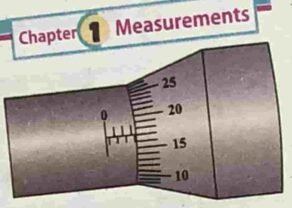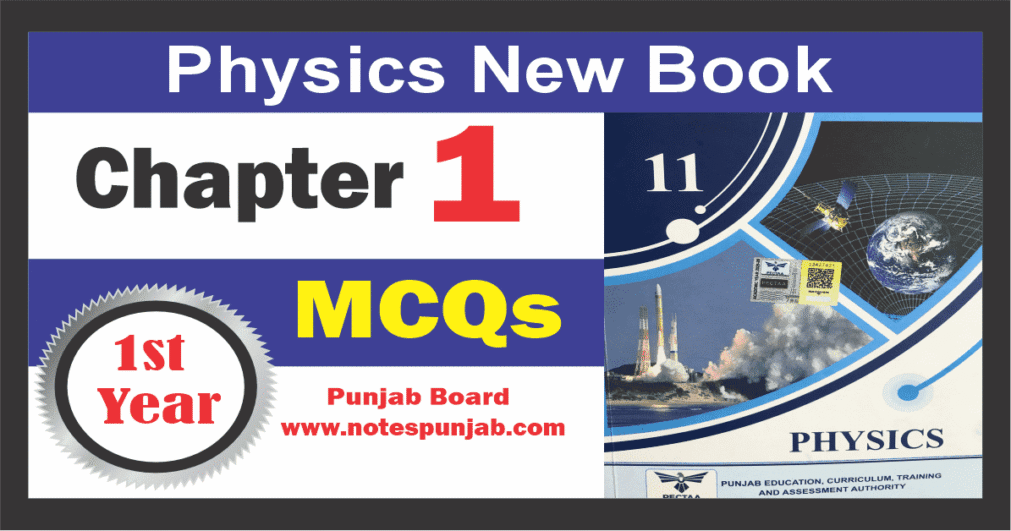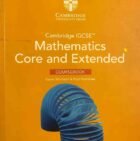11th Class Physics New Book Chapter 1 MCQs
11th Class Physics New Book Chapter 1 MCQs solution.
Tick the correct option.
1.1 The purpose of study and discoveries in Physics is:
(a) the probing of interstellar spaces
(b) the betterment of mankind
(c) the development of destructive technology in warfare
(d) development in aesthetics for the world
Option (b) is correct
The purpose of study and discoveries in Physics is for the betterment of mankind.
==========================================
1.2 The length of a steel pipe is in between 0.7 m to 0.8 m. Identify from the following, the appropriate instrument to be used for an accuracy of 0.001 m.
(a) A micrometer screw gauge
(b) A metre rule
(c) A ten meters measuring tape
(d) A Vernier Callipers
Option (d) is correct.
If length of a steel pipe is in between 0.7 m to 0.8 m, then Vernier Callipers is better for an accuracy of 0.001 m.
==========================================
1.3 The diameter of a steel ball is measured using a Vernier Callipers and its reading is shown in the figure. What is the diameter of the steel ball?
(a) 1.30 cm (b) 1.39 cm
(c) 1.40 cm (d) 1.31 cm

Option (b) is correct
1.3 + ( 9 x 0.01 ) = 1.3 + 0.09 = 1.39 cm
==========================================
1.4 The figure shown the reading on a micrometer screw gauge used to measure diameter of a thin rod. One complete turn of the thimble is 0.50 mm and three are 50 lines on the circular scale. The diameter of the rod is:
(a) 3.67 mm (b) 3.17 mm
(c) 4.17 mm (d) 4.20 mm

Option (b) is correct.
3 + ( 17 x 0.01 ) = 3 + 0.17 = 3.17 mm
==========================================
1.5 The number of significant figures of a measurement are defined as:
(a) they reflect the accuracy of the observation in a measurement
(b) they are the figures which are reasonably reliable
(c) they are the accurately known digits and the first doubtful digit of a measurement
(d) all of the above
Option (d) is correct.
==========================================
1.6 The number of significant figures in the measured mass 2500.0 kg is:
(a) two (b) three
(c) four (d) five
Option (d) is correct.
1.7 The sum 12 kg + 2.02 kg + 5.1 kg according to appropriate precision is:
(a) 19 kg (b) 19.0 kg
(c) 19.1 kg (d) 19.12 kg
Option (a) is correct.
==========================================
1.8 The answer to appropriate precision for the subtraction ( 1.126-0.97268 ) is:
(a) 0.15 (b) 0.153
(c) 0.1533 (d) 0.15332
Option (b) is correct.
==========================================
1.9 The answer of the product (2.8723 x 1.6) to the appropriate number of significant figures is:
(a) 4.59568 (b) 4.595
(c) 4.59 (d) 4.6
Option (d) is correct
==========================================
1.10 The answer to the mathematical division ( 45.2 /6.0 ) in appropriate number of significant figures is:
(a) 7.5 (b) 7.53 (c) 7.533 (d) 7.5333
Option (a) is correct.
==========================================
1.11 The answer to the following mathematical operation 24.4mx100m/5.0m to the appropriate number of significant figures is:
(a) 4880 m (b) 4900 m
$$(c)\;4.88\times10^{3\;}m\\(d)\;4.9\times10^{2\;}m$$
Option (d) is correct.
==========================================
1.12 The ratio of the dimensions of force and energy is:
(a) T
$$(b)\;T^{-1}$$
(c) L
$$(d)\;L^{-1}$$
Option (d) is correct.
==========================================
1.13 Identify which pair from the following does not have identical dimensions:
(a) Work and torque
(b) Angular momentum and Planck’s constant
(c) Moment of inertia and moment of force
(d) Impulse and momentum
Option (c) is correct.
==========================================
1.14 The following figures are of the same Vernier Callipers. Figure (1) shows the reading when the jaws are closed while Fig. (2) shows the reading when a soiled cylinder is placed between the jaws. The length of the cylinder is:
(a) 3.26 cm (b) 3.30 cm (c) 3.34 cm (d) 4.20 cm

Option (b) is correct.
3.2 + ( 6 x 0.01 ) = 3.2 + 0.06 = 3.26 cm
Lets find zero error now. Zero of the vernier scale is slightly ahead of the main scale zero, by 4 divisions. So zero error is -0.04 cm.
Correct reading = 3.26 – (-0.04 ) = 3.30 cm
==========================================
1.15 The least count of an instrument determines:
(a) precision of a measurement
(b) accuracy of a measurement
(c) fractional uncertainty of a measurement
(d) percentage uncertainty of a measurement
Option (a) is correct.
==========================================
1.16 A measuring tape has been graduated with a minimum scale division of 0.2 cm. The allowed reading using this tape may be:
(a) 80.5 cm (b) 80.6 cm
(c) 80.65 cm (d) 80.7 cm
Option (b) is correct.
==========================================
Check! the links below




